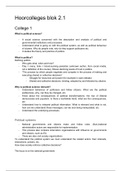Hoorcolleges blok 2.1
College 1
What is political science?
- A social science concerned with the description and analysis of political and
governmental institutions and processes.
- Understand what is going on with the political system, as well as political behaviour
of citizens. Why do people vote, why do they support politicians etc.
- It studies the theory and practice of politics.
What is politics?
Defining politics
- Who gets what, when and how?
- Poly = many, ticks = blood-sucking parasites (unknown author, from social media,
not a definition of the course). Shows declining levels of trust in politics.
- “The process by which people negotiate and compete in the process of making and
executing shared or collective decisions”
- Struggle for resources and power (for example in open debate)
- Shared and collective decisions: binding, adopted by and followed by citizens.
Why is political science relevant?
- Understand behaviour of politicians and fellow citizens. What are the political
preferences, why, can they be changed, etc.
- Know about the consequences of political transformations: the rise of illiberal
democracies and populism. Is there a worldwide trend, what are the consequences,
etc.
- Understand how to interpret political information. What is relevand and what is not,
how can we understand these messages, can we avoi being manipulated, etc.
- Understand the underlying processes.
Political systems
- National governments and citizens make and follow rules. (Sub-)national
administrative actors are responsible for implementation.
- This process also contains iinternation organisations with influence on governments
and citizens, such as EU.
- There are also civil society organizations
To understand the political system we must understand the related actors: their interests,
interactions, powers, etc.
How does society enforce collective decisions?
The focus is on the national government.





